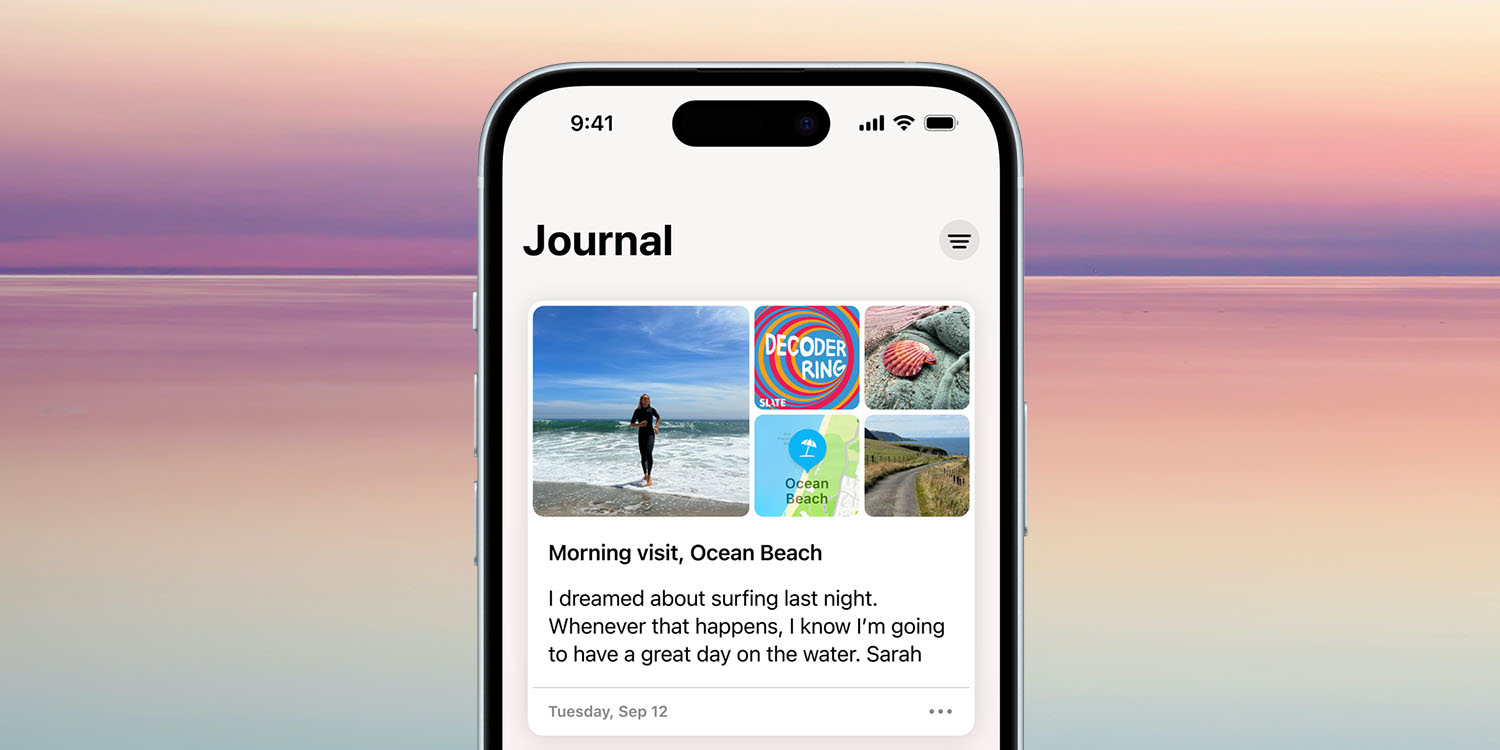
Apple’s new Journal app is now available in the developer beta of iOS 17.2, ahead of a public beta coming soon, and official launch later this year. But an early Apple Journal hands-on says that the mental health feature is unlikely to pose any threat to existing third-party journaling apps – at least, in its current form.
A longtime Day One user found that Apple’s app is extremely basic – so much so that he at first wondered whether he was missing something …
Apple’s Journal app
The app was first announced as part of iOS 17 back in June. Here’s what Apple has to say about it:
Journal is a new iPhone app that helps users reflect on everyday moments and special events in their lives. To help inspire a user’s journal entry, personalised suggestions can be intelligently curated from a user’s recent activity, such as photos, people, places, workouts, and more, and scheduled notifications can help build a journaling habit.
With the ability to lock the app, the use of on-device processing, and end-to-end encryption, Journal is built to protect a user’s privacy and ensure no one — including Apple — can access a user’s entries.
With the new Journaling Suggestions API, developers will be able to add journaling suggestions to their apps. The Journal app and Journaling Suggestions API will be available in a software update later this year.
The company said in September that it wouldn’t be available right away, but it made a limited debut in the developer beta of iOS 17.2. Currently, it’s iPhone-only, and we don’t know when it might be available on iPad and Mac.
Early hands-on says it’s very basic
In theory, an iPhone-based journaling app – with access to all the data the device collects about our movements and activities – could be super intelligent. But an early hands-on by The Verge’s David Pierce says that, for now at least, it’s incredibly basic.
The Apple Journal app is so simple that, at first, it felt like I was missing something. The whole app is just one screen: a reverse-chronological timeline of your journal entries, with a big plus button down at the bottom […]
When you’re creating a journal entry, you can add photos and video, record a voice memo, or log a location associated with your entry. When you’re looking at the timeline, you can filter to see only the entries with photos, or the extra-special entries you’ve bookmarked, but that’s about it.
Pierce describes himself as a longtime Day One user, and “nothing in Journal makes me want to switch.”
It could be much smarter
Apple’s apparent vision for the app is that it can use everything your phone knows about you to make truly smart suggestions about things you might want to record in your journal.
The big idea behind Apple Journal is that your phone can learn to recognize what Apple calls “Moments.” It can look at where you were, who you FaceTimed with, how many videos you took, and other signals that only your phone has access to and deduce that this was probably something you’d want to remember and revisit. Your phone is the only device that both knows you were on the phone with your boyfriend for an hour and that immediately afterward you listened to 11 straight Dashboard Confessional songs. It knows that you hit a personal record in your marathon training today and that you finished the run at a sick view from the top of a mountain. With access to all that information, Journal could, in theory, start to put things together and prompt you to not only add them to your personal timeline but also take a moment to reflect on them.
But there are risks
However, the smarter the app tries to be, the greater the risk that it inadvertently does something dumb. Pierce references Facebook’s On This Day feature, which tried to resurface significant memories and often bombed by showing photos of exes, and days which were anything but happy.
That may explain why Apple is proceeding cautiously in the launch version of the app.
Why is Apple doing this anyway?
Apple has of course increasingly focused on health and fitness in terms of both iPhone and Apple Watch features, with some of those – like Breathe, which later evolved into Mindfulness – geared to mental health.
Studies show that journaling can have significant mental health benefits. One of the best known of these is a 2006 study that found that journaling can be as effective as cognitive-behavioral therapy (CBT) in reducing depression.
Journaling has also been shown to reduce anxiety, reduce stress, improve memory, and even improve physical health.
FTC: We use income earning auto affiliate links. More.




Comments